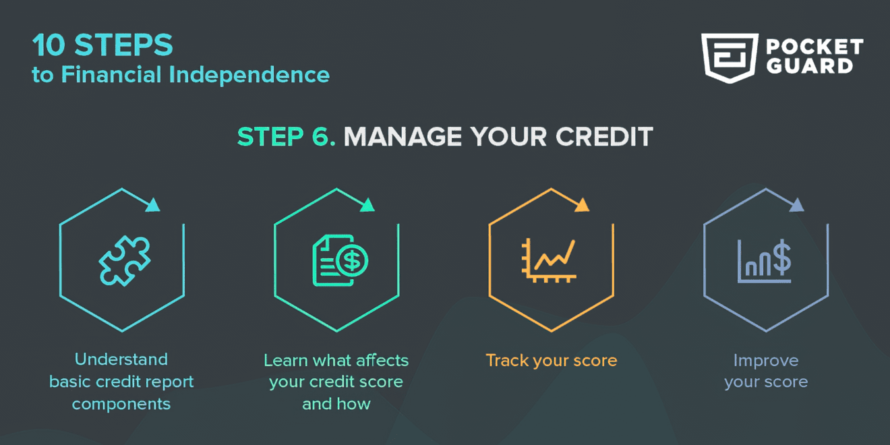Having a good credit score is an essential part of life as an adult. Credit scores not only help lenders determine whether or not they will loan you money, but they also affect interest rates on important purchases such as a car or a house. Creating and maintaining a good credit score is crucial, because without one, or with a bad score, you run the risk of not qualifying for a loan.
STEP 6: MANAGE YOUR CREDIT
Understand basic credit report components
You may be wondering what lenders are looking at when they review your credit report. One of the first things lenders look at is your credit score. Most people have scores ranging between 300 and 850. If your score is below 620, you are generally viewed as risky, while scores over 750 are seen as excellent and are safe bets to the lenders. Besides the score, credit reports show all of your personal information, such as your name, employment history, social security number, etc. This helps the creditors and lenders determine how authentic you are.
Learn what affects your credit score and how
Various elements are involved in the way your credit score is determined.
- A big one is your past payment history. Creditors look at how well you have kept up with your payments, even if it is just the minimum payment.
- Your credit/debt ratio is crucial in the creation of your credit score. That means that creditors look at how much money you owe compared to how much you make. The less you owe, the better.
- The length of your credit history is another important factor, as is the number of new credit accounts you opened or applied for recently. This last part is especially true if you have recently opened a number of different types of credit. It could be harmful to your credit score if you open too many new credit cards in a short period of time, for example.
Track your score
If you’re not sure what your credit score is, worry not, there are ways to track it. One great way to track your score is to use Credit Karma or Credit Sesame, which are free online services that show you your approximate score as well as give you the option to simulate your score and offer suggestions to improve it.
Improve your score
There are a number of ways that you can improve your score.
- If you aren’t making consistent payments, it’s time to start. Payment history makes up 35% of your score, so making your payments on time is very important, even if it’s only the minimum payment.
- Keep your debts as low as possible. If you suddenly put a huge new purchase on a credit card but don’t extend your credit line, you may run into trouble with your score. You want to try to keep credit/debt ratio below 30% if possible.
- Don’t close your credit cards. It may seem like a good idea, but keep unused credit cards open. It helps with your credit/debt ratio. If you close a card that has a $4000 limit on it, especially if it has a large balance on it, that gives you that much less credit you’ll have in that ratio.
- And don’t forget to check your credit report. There could be errors and inconsistencies that only you can catch. If you catch them, it can help you a lot in the long run.
Many people have no idea how to keep their credit in good standing, but once you do, it’s pretty easy. Simply keep your payments consistent and on time, keep your debts as low as possible, and keep track of your credit so you can stay updated and address any errors before they become irreparable.
Aug 03, 2017
Aug 03, 2017



